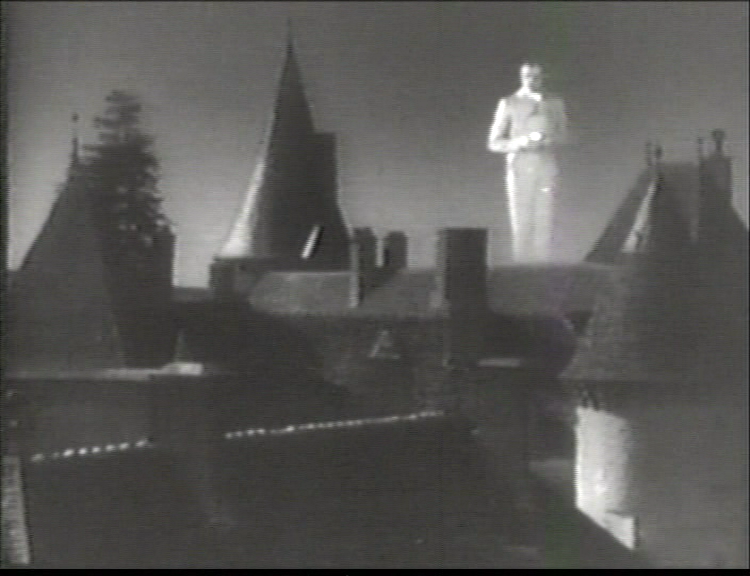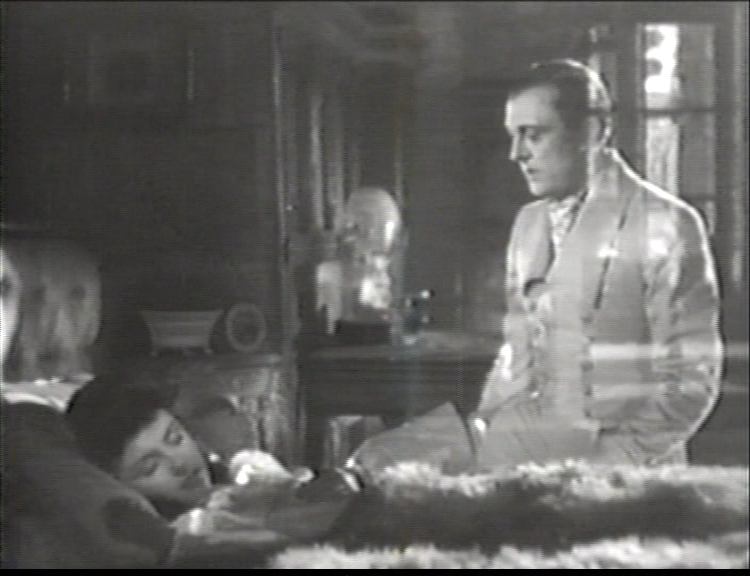
Claude Autant-Lara is not an easy man to like. This mainly stems from his disgraceful old age -- Autant-Lara belonged to that generation of filmmakers rejected by the up-and-coming nouvelle vague, and his early commercial success dried up in the Sixties, rendering him unemployable after 1977, when he was aged seventy-six. But old Claude was still physically very active (he lived to be ninety-nine) and refused to go gently into a peaceful retirement. Casting around for some means to occupy his twilight years, he alighted, as many a senior citizen has before and since, upon the idea of fascism. Joining France's far-right National Front party, he became a representative at the European parliament, where he was eventually forced to stand down after giving interviews full of racial insults, incitement to violence, and full-on holocaust denial.
So it's hard to fathom how this bitter, unpleasant and dangerous individual could have made films, in a long and varied career, which are often charming, poetic, romantic and beautiful. Perhaps if he'd been able to continue doing so his mind wouldn't have been corrupted by the canker of prejudice and hatred.
Sylvie et le fantôme (1946) is just such a movie, a gentle comic love story based on a play by Alfred Adam. The setting is a castle, the central event is a birthday party, and the theatrical farce structure at times calls to mind Renoir's La règle du jeu, an impression reinforced by the presence of that film's poacher/manservant, Julien Carette, her promoted to majordomo. But Autant-Lara's film is not a complex, bitter and strange film like Renoir's, nor is it a masterpiece. It's lightweight but poetic.
Sylvie, 18, is played by Odette Joyeux, 32 (she would still be playing a pretty young thing in La ronde, 1950). She's a wistful, dreamy girl, in love with the portrait of a deceased almost-relative, the man her grandmother loved but did not wed. She likes to imagine him as a ghost, wandering the halls of her ancestral castle. In fact, he is a ghost, and he does wander the halls of her ancestral castle. Here things get really interesting for the cinephile, because just as you may be thinking that you have no wish to engage with the wretched racist Autant-Lara's work, however "charming" someone says it is, I have to tell you that the ghost is played, in pretty well his only real romantic leading role, by Jacques Tati.

We first meet the ghost, known as the White Hunter, as he emerges from his portrait, accompanied by his faithful phantom spaniel. He's transparent and mute, as he remains throughout the film. René Cloërec's music, a breathy sort of pan-pipes creation, is extraordinarily beautiful, spine-tingling and moving. These moments lift the film from the potential mire of light comic whimsy to something ineffably beautiful.
Tati at this time had made a name for himself as a comic mime artist on stage, in which capacity his name had come up as a candidate for the role of Deburau in Les enfants du paradis, eventually played by Jean-Louis Barrault (how different film history might have been!) But producer Fred Orain remembered Tati's name, and when Sylvie came along, Tati got the part.
It's a limited role, not because the White Hunter doesn't speak, which is no disability for Tati, but because nobody else can see or hear him, so character interaction is all one way. And nearly all the business involving the ghost's interactions with the world entails special effects, so that Tati is at the mercy of sheets on strings and double exposures. Nevertheless, the casting pays off. Apple-cheeked and practically dashing in his luminous hunting garb, Tati exudes sweetness and melancholy as he attempts to woo Sylvie from beyond the grave. It ought to be a bit creepy, but it isn't.
"It's the only special effects film in the history of French cinema!" lied Autant-Lara. "It was an insane idea! One hundred and three takes with special effects, and we had absolutely no gear! We used an optical glass, just like when in a railway carriage you can see in the window both the scenery on the other side and a reflection of the people inside. You look at the set through the optical glass, and on the left, placed at exactly ninety degrees to it, the same identical set covered in black velours. Imagine the size of the whole thing! Two sets instead of one! And it was all shut in, it was like an oven in there! The slightest movements of old Tati had to be mapped out on both sets... we were stuck in the studio for four months, we got about three hours' sleep a night, whilst that producer wrote me letters saying I was a scoundrel and a thief!" -- Autant-Lara, quoted by David Bellos in his biography Jacques Tati. As the filmmaker describes his work, he uses the hyperbole and hysteria of the politician.
Plot complications: Sylvie's father (Pierre Larquey, a Clouzot regular: the batty psychatrist in Le corbeau) wants to celebrate her coming of age with one last night of childhood fantasy. He wants the ghost she believes in to appear to her for one night. So he sends for an actor to impersonate the ghost, wearing a Klan-like shroud. Not one but three impersonators show up: an aging ham actor from the agency, a young fellow in love with Sylvie, and a burglar. All three are hired to don the yellowing robes and appear in turn at Sylvie's birthday party, to startle the guests and delight Sylvie. Sylvie will meet and romance both the young swain and the young fugitive from justice, believing them both to be the ghost. It's complicated stuff, young love.

Jealous, the ghost decides to steal the old actor's costume and impersonate himself. At least wearing a sheet he will be visible to Sylvie. Farcical complications pile on top of each other, all worked out with high technical cunning, but as in most French cinema of the pre-New Wave era, there's a tender melancholy underneath, and that's Tati's department. At the end, Sylvie has made her choice and invested her emotions in life and reality. The ghost departs for the heavens, his translucent cocker spaniel barking silently behind him, the astral woodwinds blowing farewell.
It's hard to square this lovely film with Autant-Lara's later, bilious political activities. Giving due credit to screenwriter Jean Aurenche, a legendary figure in French film, as actor (in L'Age D'Or), animator and screenwriter (for Carné and Allegret, and later Tavernier) helps, but Autant-Lara still must be credited with accessing some kind of inner beauty of spirit, not yet extinguished or curdled. A film like this is a small bauble to place in the balance against his later evils, but it will hopefully outlast them.
***
The Forgotten is a regular Thursday column by David Cairns, author of Shadowplay.